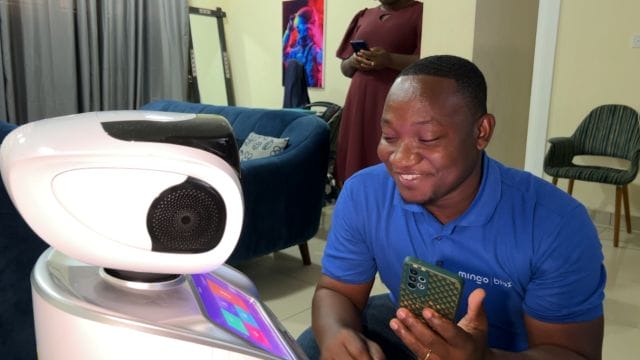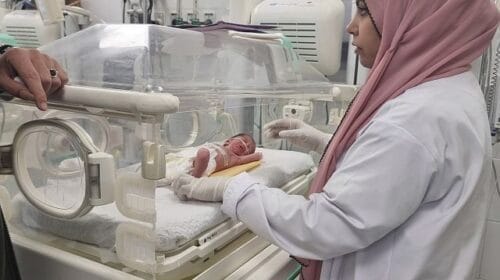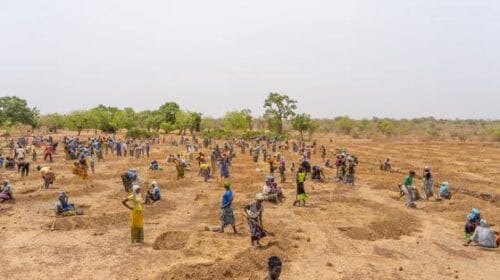Ghana’s tech innovators building AI tools for social impact
Benjamin Nortey joined by two of his staff at his Mingo Blox office in Ghana’s capital Accra operates his newly built robot which is powered by Artificial Intelligence (AI).
The machine called Cello has been programed by Nortey, a leading Ghanaian roboticist to provide several social services for users.
“Cello can be used in several places where there is that social interaction, for-example within the health care [system],” he said in an interview with DW TV.
“You can use Cello to assist the elderly, within the customer service environment you can actually place or position cello there to perform or guide people who come around the supermarket, displace prices.”

Nortey isn’t only interested in building robots for social services but also machines and software that provides tech lessons to young people.
– Advertisement –
He organises regular classes both in-person and online for children, hoping to raise the next generation of roboticists.

AI contribution to Africa’s GDP
AI is estimated to contribute over $1.5 billion to Africa’s GDP by 2030. Ghana wants to take advantage as several innovations continue to spring up.
In a farm owned by the University of Ghana, young drone pilots operate flying robots that help to take images of crops such as cashew on farmlands.

The images are then processed with an AI tool to detect where pests and diseases are.
Andrews Kangah from KaraAgro AI explained that with such a tool, farmers are supported to take steps to prevent their crops from serious damage.
“The benefits in that is that once they get this, they know exactly what is wrong in the farm, not that they have to go and scout and try to figure out what is wrong. With this the application pinpoints exactly what is wrong, abiotic, whether it is disease, whether it is pest that is disturbing the farm then they can control it,” Kangah said.
There are AI products also in the health sector with the Korle Bu teaching hospital, one of Ghana’s leading health facilities adopting innovative tools.
Health care gets AI support
In its radiology department in the facility located in Accra, X-ray images taken from patients are better read with the help of AI platform designed by the firm called Mino-Health.
The system enables quicker and accurate diagnosis of ailments, helping radiologists get their jobs done with ease.

“It has helped with imaging; it picks the diagnosis faster. A lot of work can be done within a short time. Reporting time is markedly reduced when you are using AI systems and volumes of work can be done within a short time,” Dr. Klenam Dzefi-Tettey who heads the Radiologist department at the Korle Bu Teaching Hospital said.
Ghana is grappling with shortage of health workers in many hospitals. Some of have left the country for better working conditions in Europe.
There aren’t enough trained health workers to fill the gap and that comes with extra pressure. Developers of the Mino-Health platform want their AI tool to fill these gaps.
“Lack of enough equipment and enough facility to process all these data makes the introduction of technology and artificial intelligence critical and the only way we can actually catch up with the rest of the world is to leapfrog and this creates the platform for us to leapfrog,” William Ofori, Mino-Health AI Labs said.
Killing old jobs, creating new ones
This new technology is seen by many as away to boost economies and create new jobs but there are fears that existing jobs could be at risk.
Not many people are quickly upgrading their skills to match up with the new technological tool.
Darlington Akogo from the Runmila AI Institute said workers must begin to learn new skills to remain relevant.
“Generally people should be willing to upskill themselves, learn new skills, learn how to use AI system. How would I help make your job easier? You need to start leveraging those stuff. And so once you do that, the threat of job displacement is minimal again, at least in the next few years,” Akogo said.
There are also calls from the industry for some level of regulation to tackle the excesses that come with adopting AI technology.
How artificial intelligence helps banks, fintech startups, and users
Regulating AI
Nortey said “Government and policy makers must also get involved in the whole process. There are other lethal consequences that could also emerge if policies are not being put in place, certain things are not quite regulated because there are bad guys out there who can also use these tools to be able to advance their agenda.”
Akogo agrees with regulation but warned against excessive guidelines that kill creativity and innovation.
“If you swing the pendulum too far and go with excessively regulating AI because you are afraid of the risks, what would happen is that it stiffens innovation and for a continent like Africa that finally has that can help it solve a lot of its problem, we miss our chance because we are scared and we over regulate,” Akogo said.
Developers in Ghana though continue to build new tools hoping to take advantage of the shifts happening in the sector. They are making strong case for useful AI interventions in human activities.
Source: Africafeeds.com
Sourced from Africa Feeds



